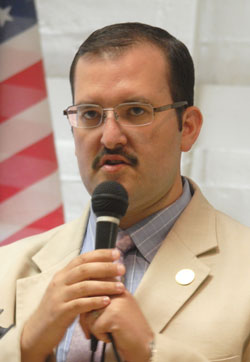
Photo by J.P. Crumrine
On a sweltering 100-degree afternoon in Anza, the controversial State Responsibility Area Fire Prevention Fee was the hot topic for discussion.
State Sen. Jeff Stone arranged for Jordan Marks, district director of Taxation and Regulatory Affairs for the state’s Board of Equalization, to discuss the status and future of the infamous state levy. Nearly 50 people crowded the Anza Community Center to learn what they could do about their personal assessments and their options.
While Stone was still in Sacramento voting on the state budget, his District Director Glenn Miller and staff member Jesse Ramirez presided over the session and introduced Marks, who is on the staff of BOE member Diane Harkey.
Marks’ basic message was you have to pay the fee, but file an objection. Although the “Petition for Redetermination” form states it must be filed within 30 days of the fee’s annual statement for payment, Marks stressed, if the courts find the fee illegal and refunds due, the BOE will look for any correspondence from property owners indicating their objection to paying the fee.
In response to a question about what would happen if a property owner failed to file an objection in one year, but had in other years, Marks replied, “File an objection for that year, too. File anyways because it’s a record.”
Ideally, property owners will file the Redetermination petition annually, but Marks said that may not always be possible. So file it now and each year. One advantage of filing this form is identification of the owner’s parcel number and the specific fiscal year, which would make refunds easier, he added.
The Legislature is attempting to extend the 30-day requirement to file a “Petition for Redetermination,” according to Marks. Assembly Bill 203 has passed several committees and is awaiting a vote by the entire Assembly before going to the Senate, where Senate Bill 250 just came before a hearing.
Although Marks said the fee revenue can be used only for educational purposes, “Not any for fire trucks, extra hoses or another firefighter going through the academy,” Cal Fire says, “This fee will fund a variety of important fire prevention services within the SRA, including brush clearance and activities to improve forest health so the forest can better withstand wildfire.” Other activities funded by the fee include firebreak construction, defensible space inspections, fire prevention engineering, emergency evacuation planning, fire prevention education, fire-hazard severity mapping, fire-related law enforcement and implementation of the State Fire Plan.
The Howard Jarvis Tax Association is challenging the fee’s legality in a court case. In August, the court will listen to arguments about certifying the case as a class action. Marks said the members of the possible class would be all those property owners who have paid and objected to the fee payment.
“I assume the court will ask the Board of Equalization to decide on refunds,” Marks opined. “Given the current make-up of the board, anywhere we see an objection, a refund is likely to be granted.”
The Fire Fee was enacted in 2011 with a simple majority of both houses of the state Legislature. This is the basis for the Jarvis lawsuit, which was initially filed in 2012.
First, Jarvis argues that the fee is not a special charge for properties benefiting from special state fire support. HJTA claims the fee is actually a tax. If that is true, then the Legislature needed two-thirds of the members voting for it, not just a majority.
While the August hearing is just to decide the merits of a class-action suit, if the court eventually decides the case in HJTA’s favor, Marks speculated that the state attorney general would appeal that decision. Thus, the suit’s ultimate outcome will stretch several years into the future.
Earlier, Marks remarked, “Some of the best advocates against the fee are fire districts because they have to work for their money.”
But also attending the meeting was Idyllwild Fire Protection District Commissioner Nancy Layton, who stated, “Very few residents of Idyllwild like the fee.”
In a separate correspondence, Idyllwild Fire Chief Patrick Reitz wrote, “The district remains opposed to the fire fee as stated at the time of implementation during a board meeting.” In November 2012, the IFPD board passed a resolution opposing the fee.
Although the fee was enacted to provide additional funds for Cal Fire, that agency is not equipped to collect revenue. The annual fee generates about $70 million.
BOE is responsible for collecting the fee, which is why the notices for payment originate from there and payment is remitted to BOE.
When asked about the boundaries for SRAs, Marks said Cal Fire sets those; but any changes would probably keep Anza and much of the Hill in an SRA.
An unintended consequence of the fee and the SRA maps, according to Marks, is that some insurance companies are using the maps to identify high-risk fire areas. Consequently, they are raising rates or withdrawing policies from those areas. Marks said he has discussed this situation with State Insurance Commissioner David Jones and invited him to speak to residents in this area.










